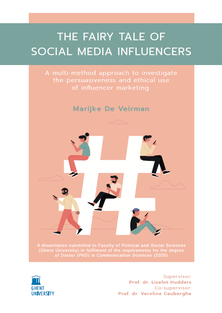Influencer marketing
Researcher(s): Marijke De Veirman
Promotors: Liselot Hudders and Veroline Cauberghe
Duration: October 2014 to June 2020
Description
Some social media users, referred to as influencers, earned a large audience of followers, by creating and sharing entertaining narratives about their personal lives or by demonstrating expertise on relevant topics. Their large network, their content creation skills and the fact that followers perceive them as likeable, credible and relatable role models, resulted in brands asking them to endorse their products in exchange for free products and / or monetary payment, a practice which has been referred to as influencer marketing. Accordingly, in the current media landscape, social media influencers can be considered a new type of brand endorser. Despite the increasing use of influencers for marketing purposes, research on how they influence consumers’ brand-related attitudes and decisions, is still in its infancy. In addition, many ethical issues arise with the practice of influencer marketing as influencers create commercial content and distribute it to their audience. This commercial content appears in-between the regular editorial content of the influencer, making it hard for followers to recognize it as advertising. As such, questions arise concerning how influencer marketing can be made more transparent (e.g., by adding advertising disclosures), in particular when targeted at vulnerable audiences, such as minors. Therefore, the overarching objective of this dissertation is to examine the persuasiveness and ethical use of influencer marketing.
Based on insights from academic literature, influencer marketing practice and related societal and regulatory concerns, this dissertation addresses three research objectives using a variety of research methods i.e., literature review and bibliographic analysis, experimental research, content analysis and in-depth interviews. Research objective 1 aims to provide an overview of influencer marketing research to date. Extra emphasis was put on influencer marketing targeting children. Research objective 2 focuses on the persuasiveness of influencer marketing and aims to provide a contribution to the important managerial question which influencer to cooperate with when implementing an influencer marketing strategy. Finally, in research objective 3, the focus is placed on the ethical use of influencer marketing, in particular, the importance of advertising disclosure and the vulnerability of minors, both from a consumer as from an influencer perspective. The three research objectives were tackled in six empirical research projects using different research methods, developed in six academic articles.
Full description and dissertation available here.
